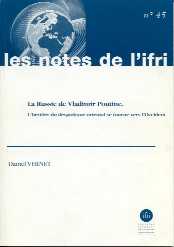The Russia of Vladimir Putin: The Heir of Eastern Despotism Turns Towards the West

Despite the westernization of Russia's foreign policy, the Kremlin's domestic policy still remains dominated by 'Eastern despotism'.
The attacks of 9/11 2001 accelerated the rapprochement between Russia and the West, particularly with the United States, which was already under way. The 'new strategic framework' sought by George W. Bush is gradually emerging. Vladimir Putin did not take long to commit himself, by immediately expressing his solidarity to the U.S. following the Al-Qaida attacks on the World Trade Center and the Pentagon.
This solidarity has not remained merely verbal. It has taken concrete forms and has led to broader agreements. To date, however, this 'westernization' of Russian foreign policy has not been accompanied by a similar movement on the domestic side. On the contrary, certain characteristics deriving from 'Eastern despotism', visible in the post-communist, post-Yeltsin Russia, have tended to become more pronounced. This is how Putin has reacted to the triple crisis-over identity, politics, and economics-that his country was going through when he took over as President in 2000.
Inasmuch as the U.S. has made the fight against terrorism the main discriminant for international relations, it hardly feels concerned by this situation and has even explicitly expressed its approval (along with the Europeans) for the continuation of the war in Chechnya. It is even prepared to make Putin's Russia the paragon of virtue it most certainly is not. Putin himself does not seem to have chosen between the different options before him: the Chinese model (despotic capitalism), forceful reformism (imposition of liberal measures), fighting terrorism (leaving aside the internal situation) and dual westernization (external AND internal), the only true guarantee that Russia will remain within a 'civilized' system of international relations.
Daniel Vernet is the Director for International Relations at Le Monde. Since 1973, he worked as the newspaper's correspondent in Bonn (1973), Moscow (1977) and London (1981). He also was Le Monde's editor in chief from 1985 to 1990. He published Le Rêve sacrifié. Chronique des guerres yougoslaves (Paris, Odile Jacob, 1994), La Renaissance allemande (Paris, Flammarion, 1992) and URSS (Paris, Le Seuil, 1990).
Download the full analysis
This page contains only a summary of our work. If you would like to have access to all the information from our research on the subject, you can download the full version in PDF format.
The Russia of Vladimir Putin: The Heir of Eastern Despotism Turns Towards the West





